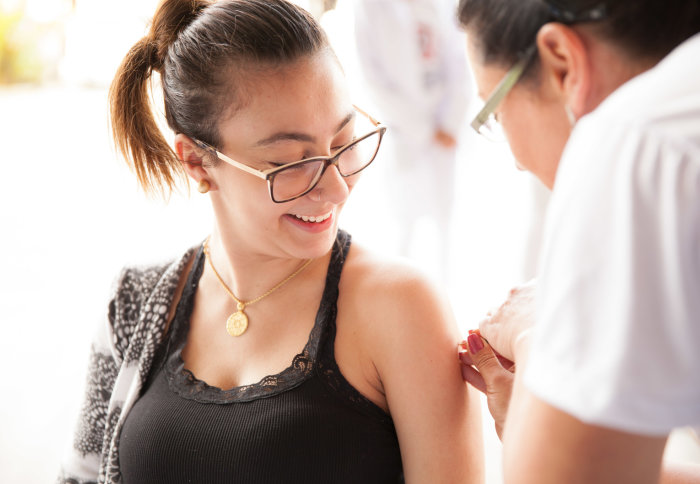Machine learning helps to refine efficacy of dengue vaccines
by Jack Stewart

Dengvaxia vaccine being administered in Brazil
Researchers from Imperial's School of Public Health have used machine learning to understand how groups are likely to respond to dengue fever vaccines
Dengue is a tropical disease spread by mosquitoes, with infection caused by one of four closely related dengue viruses (called serotypes).
It is the most prevalent arboviral infection in humans, with almost half of the world’s population at risk of infection each year, and its effects can range from flu-like symptoms to a life-threatening form of the condition, causing haemorrhaging and loss of consciousness.
To date, only one vaccine for dengue has been licensed, called CYD-TDV (now marketed as Dengvaxia®) developed by Sanofi Pasteur. It has been approved in more than 18 countries with the first mass immunisation campaigns taking place in the Philippines and Brazil.
Previous trials have shown that the vaccine is significantly more effective in people who have been exposed to dengue in the past. Currently, the vaccine is only recommended for people exposed to dengue prior to the time of vaccination.
Researchers from the MRC Centre for Global Infectious Disease Analysis (formerly the MRC Centre for Outbreak Analysis and Modelling), along with staff from Sanofi Pasteur, used machine learning to estimate how effective the vaccine would be for certain groups of patients, based on the type of virus they had been exposed to.
The study, recently published in Nature Communications, found that over all ages (2–16 years) the vaccine is protective against three types of dengue (serotypes 1, 3 and 4) regardless of previous exposure, with significantly better results in those aged 9–16. The study also shows that efficacy against the remaining type of dengue (serotype 2) is significant only in pre-exposed subjects.
Dr Ilaria Dorigatti, lead author on the study, said: “These findings imply that vaccination campaigns must be tailored to the local setting and that their impact on the population is dependent on the type of dengue virus in circulation at that time, and in the future.”
The method of using machine learning was used to refine efficacy estimates and the team believe it could be used to assess more variables in future.
“It will be interesting to apply the method developed in this paper to estimate the vaccine efficacy using the long-term follow up data,” explains Dr Dorigatti. “This would allow us to explore whether efficacy of the vaccine varies over time, and whether such changes depend on baseline serostatus.”
Article text (excluding photos or graphics) © Imperial College London.
Photos and graphics subject to third party copyright used with permission or © Imperial College London.
Reporter
Jack Stewart
School of Public Health